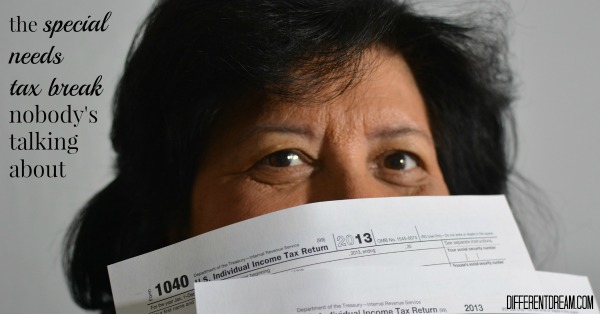The Special Needs Tax Break Nobody’s Talking About

Have you heard about the special needs tax break nobody’s talking about? Guest blogger Rachel Olstad tells Different Dream readers about a special needs tax break her family recently discovered. You’re going to love what she has to say. I guarantee it!
My husband and I are fortunate enough to get paid to take care of our adult disabled son. This arrangement began several years ago through our state’s Medicaid Home and Community-Based Services Waiver program. We were delighted with the program as it enables us to keep our son in our home – and we’re getting paid for something we’ve been doing for the last 26 years. It’s a win-win!
We were even more delighted a couple months ago to discover that our income through the waiver program is income-tax free. Wait! What? Here’s the scoop on the special needs tax break nobody’s talking about.
Non-related caregivers (think foster care families) have taken advantage of the Difficulty of Care Income Exclusion (DOC) for adults who live in their home. Parents heard about exclusion and asked, “Why doesn’t this include us?” So, in 2014 the IRS issued Notice 2014-7. While it doesn’t specifically state that parents are eligible, the notice now includes parents because the adult they care for lives in their home.
We stumbled upon this information when our state changed companies that processed our paychecks. The new company had information on this exclusion on their web page as well as on the paperwork we completed so they could issue our paychecks. When I called and asked the old company why they didn’t tell us about the exclusion, they said they could not give any financial advice to individuals. Fair enough.
But why didn’t my son’s caseworker tell us about it? I don’t know. But I do know that we took this new-found special needs tax break information to our CPA, our taxes for 2014 and 2015 were refiled. We received a sizable chunk of money from the IRS and from our state. Woohoo for us! All states may not consider this income as an exemption, so check your state laws and consult a CPA.
As long as the waiver and this exemption remain intact, this special needs tax break will help us plan for our son’s future as we age. The financial advantages will make it easier to find a caregiver to live with our son and become his family when we are no longer capable of taking care of him.
Of course, our trust for provision and for the future ultimately remains in the Lord, not in government programs. But for now, these special needs tax breaks and waivers ease our minds and our burdens. Maybe they can do the same thing for you. Happy Tax Day!
Your Special Needs Tax Breaks?
Do you know of other special needs tax breaks? Give them a shout out in the comment box so more people can access them. Thanks!
Do you like what you see at DifferentDream.com? You can receive more great content by subscribing to the quarterly Different Dream newsletter and signing up for the daily RSS feed delivered to your email inbox. You can sign up for the first in the pop up box and the second at the bottom of this page.
By Rachel Olstad
Rachel Olstad began her journey into the world of disabilities in 1990 when her oldest child was born with spina bifida and subsequently diagnosed with autism. She volunteers with Joni and Friends Southern Oregon, helping to meet the physical, emotional and spiritual needs of individuals and families affected by disability and encouraging churches to include all people. She was a contributing writer for both Special Needs Smart Pages and Nursery Smart Pages (Gospel Light), has been published in the Journal for Religion, Disabilities & Health, and was an assistant editor on Beyond Suffering: A Christian View on Disability Ministry. (Christian Institute on Disability)
12 Comments
Submit a Comment
Subscribe for Updates from Jolene
Related Posts
When Special Needs Parenting Guilt Tries to Steal Your Joy
Guest blogger Lisa Brown explains how you can cope when special needs parenting guilt tries to steal your joy.
Why Is Expressing Gratitude Especially Important for Families with Disabilities?
Why is expressing gratitude especially important for families with disabilities? Guest blogger Kristin Faith Evans provides three reasons.
Organizational Strategies Are Saving My Life Right Now
In the midst of the chaos of caregiving, I’ve found that organizational strategies are saving my life right now.






Hi Cheryl, I wish I knew the answer to your question, but I don’t. I am representative payee for my 91-year-old mother, a designation I was able to get because I am her power of attorney. If you are your daughter’s power of attorney, you may already be her representative payee or should be able to arrange that. You should call your area social security office and talk to someone there. Best wishes! Jolene
I am a mother of a 52-yr old daughter with cerebral palsy. I am one of her caregivers paid through the OBRA waiver. The agency we go through has told me there is a requirement that the parent must be the representative payee for my daughters SS payments. Do you know the answer to this?
Kathy, thank you for that comment. What a help to parents!
If you google Notice 2014-7, they will inform you where to put that Notice on your 1040 to deduct the income received for care of a family member in your own home. This will decrease your federal adjusted gross income (line 37). If your state begins with that income (line 37), it will then not be included in your state taxes either.
That is great advice. Thank you for it!
A list of items that are tax deductible can be found in the IRS Publication 502 Medical and Dental Expenses (Including the Health Coverage Tax Credit). Many states have a Disabled Dependent deduction as well. A good CPA can help families find these deductions but it is important to ASK for them when meeting with that CPA!
Hi Julie,
This post was written by a guest blogger, so she’s the expert. Read the post carefully, follow the links, and visit with your CPA. The federal tax law will be the same in every state, but you should check with someone from your state concerning state tax breaks as they differ depending on where you are. All the best! Jolene
Some states will give a significant tax deduction when an adult person on SSI/SSDI lives in and contributes to the costs of a home with a mortgage.
I found this to be very interesting. Thank you for sharing. I had no idea. Maree
How can I look into this information for our disabled son.? We have 3 chronically disabled children. Oldest is 19. Where can I start? We live in Alabama. Thanks so much!
Thank you for the information, this does not apply to use now, but possibly in the future.
Wow thank you for sharing this info I had no idea about this tax break here in Illinois it’s so difficult .